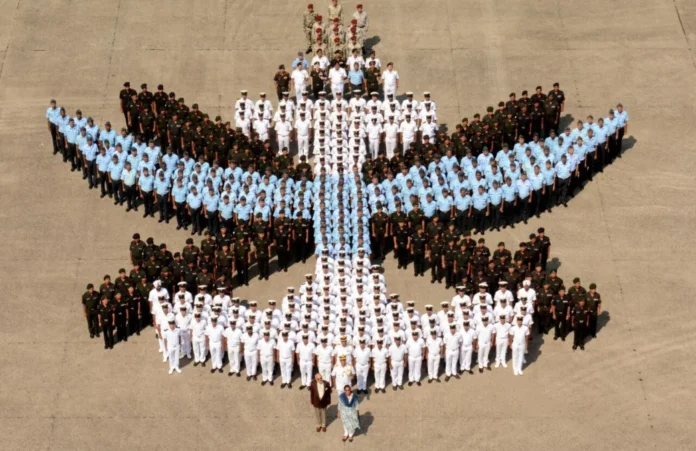More than two decades ago, as an aftermath of Operation Vijay, a recommendation was strongly echoed – jointness and integration of the defence forces. After the Rajya Sabha passed the Inter-Services Organisations (Command, Control & Discipline) Bill in this Monsoon Session of Parliament, that recommendation is coming to vision.
India has always had an inclination towards joint efforts and amalgamating the expertise of various domains, be it the erstwhile Joint Services Wing, now National Defence Academy (NDA) or the setting up of the Andaman and Nicobar command, a tri-service command in 2001.
Carrying forward this idea and to combat the risks posed in today’s national security environment, there is a need to have integrated ‘Theatre Commands’, comprising all 3 forces, commanded by a single officer. This Bill pertaining to ISOs (Inter-Services Organisations) will establish a legal framework that grants the commander-in-chief or officer-in-command the authority to wield powers over personnel from all three functional forces.
Currently, India has 17 service-oriented commands – 7 of the army, 7 of the air force and 3 of the navy. These commands are led by 3-star rank officers of the respective force, who are solely responsible for the administration and decision-making of their command.The creation of theatre commands will facilitate the sharing of resources among different forces, avoiding duplication and enhancing their efficient utilisation. For example, apart from the Air Force, even the Army and Navy have their own aviation wings. When individual aircraft or helicopters are procured for each service, India incurs expenses for multiple training procedures, infrastructure upgrades, duplicate parts, and more. Due to variations in the timelines of these purchases, the costs for acquisitions made in later years’ experience a notable increase. Should India opt to acquire helicopters in a single comprehensive procurement, with the intention of shared utilisation, the nation could negotiate for a more favourable deal, as larger quantities often result in reduced costs. This principle was evident in the disagreement between the Indian Air Force (IAF) and the Indian Army during the acquisition of Apache helicopters.
Theatre commands will also result in swift decision-making and improved coordination, eliminating communication barriers among the forces when responding to attacks.
The establishment of theatre commands gained momentum with the appointment of the inaugural CDS, General Bipin Rawat, in January 2020. The anticipated completion is projected for early 2025. While this timeframe might seem extensive, analysts like Nitin A Gokhale, the founder of BharatShakti and StratNewsGlobal, consider it reasonable considering the transition periods in other major armies, such as China’s, which took around seven to eight years.
The concept of theatre warfare is not new to the nation with most major countries like China, the US and Russia operating on the same lines. This unified approach became popular during World War II when an entire geographical area of land, air and sea of multiple countries was engaged in war.
Deviating from the initial thought of establishing five theatre commands, the approach evolved in 2023 under the leadership of CDS Anil Chauhan. The revised plan suggests the formation of three comprehensive theatre commands instead, which will be responsible for overseeing different areas: the northern region bordering China, the western borders adjacent to Pakistan, and a maritime command covering the southern part of India.
The notion of creating a distinct air defence command has been abandoned as there were concerns that it could relegate the IAF to a supporting role, neglecting its multifaceted involvement in areas such as offensive and defensive counter-air, strategic strike, air transport, and intelligence. Air Chief Marshal V.R. Chaudhari deemed this detrimental, as robust air defence intertwines with counter-air and offensive operations.
Moreover, it is decided that air assets will not be exclusively assigned to a theatre command; instead, they will be repositioned as needed depending on the situation. The multirole nature of IAF’s fighter aircraft provides significant adaptability in their utilisation. Allocating dedicated forces to a specific theatre could potentially impede this flexibility, especially in situations where resources are constrained.
At present, the regulations for Armed Forces personnel are based on the stipulations outlined in their respective Service Acts: the Army Act of 1950, the Navy Act of 1957, and the Air Force Act of 1950. The passage of this Bill will yield several practical advantages. These include ensuring disciplined conduct within inter-services establishments through the supervision of ISO (Integrated Services Officers) heads, eliminating the necessity of relocating individuals facing disciplinary actions to their original service units, efficiently resolving cases of misconduct or lack of discipline, and preventing redundant proceedings to conserve public funds and time.
While presenting the Bill in the parliament, Defence Minister Rajnath Singh clarified that the ‘ISO Bill-2023’ essentially functions as an ‘Enabling Act’. He emphasised that it doesn’t intend to bring about any changes in the existing Service Acts/Rules/Regulations. These established frameworks have proven their effectiveness and have successfully undergone legal examination for decades. It was further highlighted that service personnel, during their service in or attachment to an Inter-Services Organisation, will continue to be governed by their respective Service Acts, as stated in the Bill explanation.
In an era where safeguarding the nation relies heavily on technology, cyber expertise, and a network-centric strategy, it is imperative for all branches of the armed forces to collaborate seamlessly. The luxury of mobilising resources, when the need arises, cannot be afforded. Through the approval of this Bill, we are propelling ourselves towards a more integrated defence framework, making significant strides in this direction.
–The writer is a policy and trade specialist with Invest India. She is an acute observer of the Indian Aerospace and Defence sector, with an eye for emerging iDEX start-ups and MSMEs. The views expressed are of the author and do not necessarily reflect the views of Raksha Anirveda





